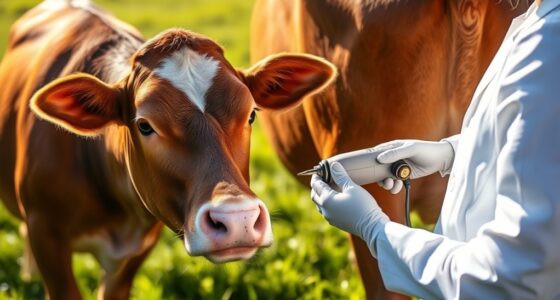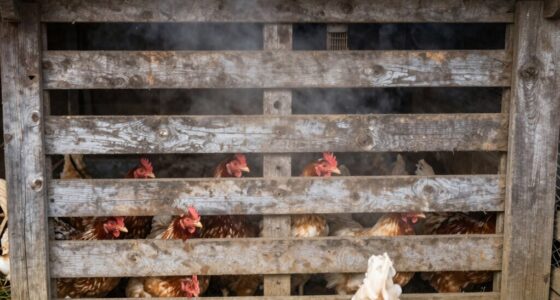Fermented grains can boost your chickens' health and productivity greatly. By incorporating these into their diet, you enhance their digestive health, which improves nutrient absorption and can increase egg production by 10-15%. The process is simple: soak whole grains in dechlorinated water, and let them ferment in a warm spot. Your hens will enjoy tastier, nutritious feed that not only supports their health but also leads to larger egg yolks. Plus, adjusting feeding practices with the seasons can optimize benefits further. If you're curious about the best methods to get started, there's more to explore.
Key Takeaways
- Fermented grains enhance nutrient absorption, leading to healthier chickens and improved egg production rates by 10-15%.
- Regular access to fermented feed promotes natural foraging behaviors, contributing to overall flock vitality.
- Fermentation improves egg quality, resulting in larger yolks and higher market value for your eggs.
- Seasonal feeding adjustments, such as timing and portion sizes, optimize the benefits of fermented grains based on temperature.
- Consistent health assessments help fine-tune feeding practices, ensuring optimal nutrition and productivity for your flock.
Historical Context of Poultry Feed
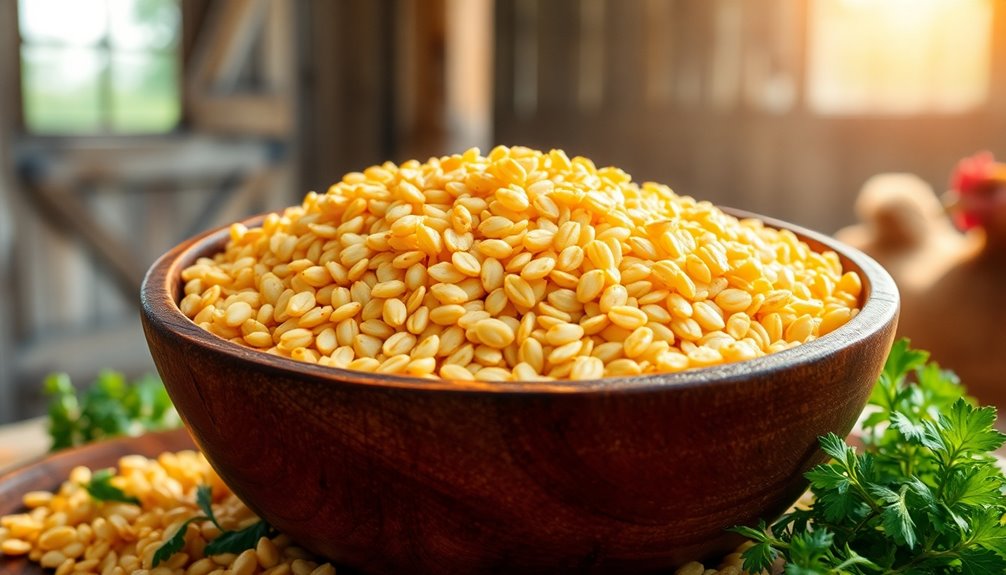
For centuries, chickens primarily foraged for their food, scavenging insects, grains, and plants on general farms. This natural foraging provided a basic diet, supplemented by household scraps and calcium sources to support their health and enhance egg production.
As the 20th century approached, the poultry industry underwent a significant transformation. Specialized farms emerged, leading to the creation of nutritionally complete feeds tailored for poultry. These feeds balanced grains, protein, minerals, and vitamins, meeting the specific nutritional needs of various breeds.
This shift from foraging and scraps to formulated feed not only improved overall poultry health but also boosted productivity. Today, modern poultry relies heavily on these scientifically designed feeds to thrive and maximize their egg-laying capabilities.
Nutritional Requirements for Chickens
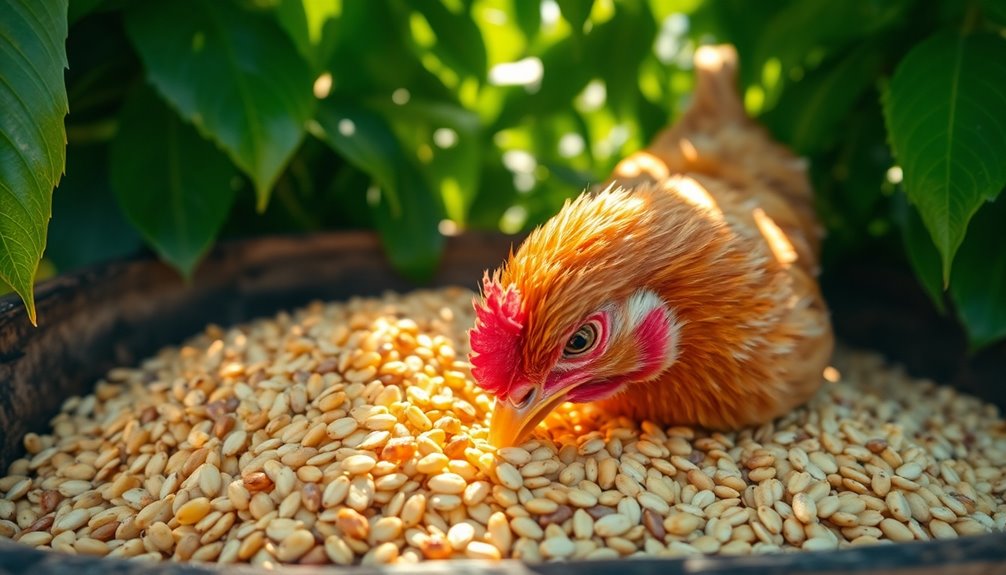
Understanding the nutritional requirements for your chickens is vital for their health and productivity.
You'll want to make certain they get enough protein, calcium, and essential vitamins to support egg production and overall growth.
Essential Nutrients for Chickens
Chickens' nutritional requirements are fundamental for their health, growth, and egg production. To guarantee your flock thrives, focus on providing a balanced diet rich in essential nutrients:
- Protein: Aim for 16-20% protein for layers to support egg production.
- Vitamins and Minerals: Include important vitamins A, D, E, and B-complex, along with minerals for metabolic processes and gut health.
- Calcium: While calcium is critical for laying hens, make sure they get enough through a balanced diet to support overall health.
Incorporating the fermentation process can improve the absorption of nutrients, resulting in healthier chickens. Additionally, providing educational toys for your flock can promote natural behaviors and enhance their well-being.
Regular access to clean feed enhances digestion and guarantees your flock remains productive.
Prioritizing these nutrients will set the foundation for a thriving chicken coop.
Calcium Intake for Hens
Guaranteeing hens get enough calcium is essential for their health and egg production. Laying hens need about 4 grams of calcium daily, as each egg contains around 2 grams. A lack of calcium can result in weak eggshells, increased breakage, and serious health issues like osteoporosis. Additionally, ensuring access to various payment options can enhance customer satisfaction, which is similar to providing diverse calcium sources for optimal hen nutrition.
| Calcium Sources | Bioavailability | Benefits |
|---|---|---|
| Limestone | Moderate | Supports eggshell formation |
| Oyster Shells | High | Rich in calcium |
| Fermented Feed | Very High | Enhances nutrient absorption |
| Commercial Feeds | Variable | Tailored for laying hens |
| Green Leafy Vegetables | Low | Provides additional nutrients |
Regularly monitor calcium levels, especially during peak laying periods, to guarantee your hens meet their nutritional needs and maintain ideal hen health.
Types of Poultry Feed Available
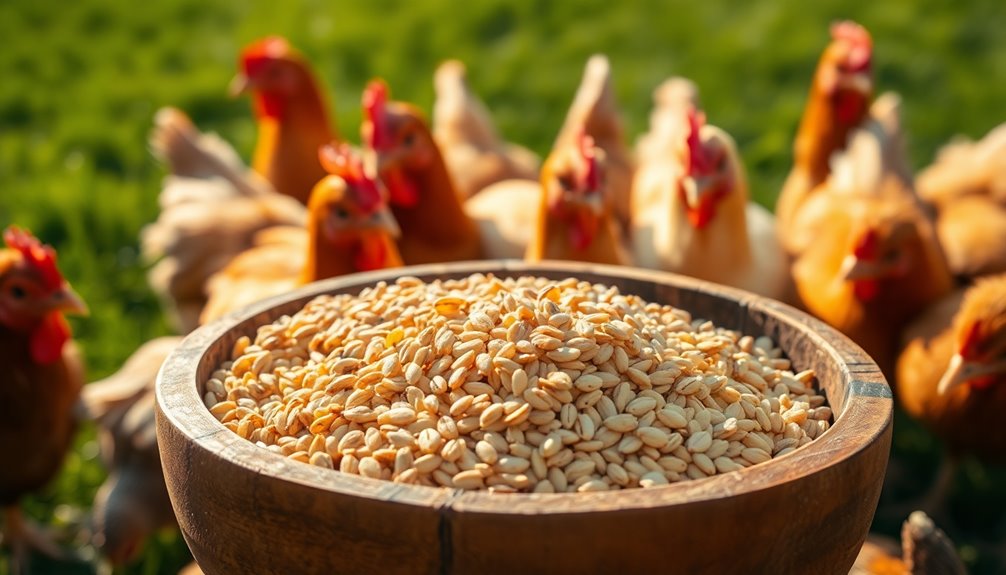
When it comes to feeding your poultry, you have several options to choose from, each designed to meet specific nutritional needs.
Here are three popular types of poultry feed:
- Mash – A ground form of chicken feed that provides essential nutrients in a simple format, ideal for a balanced diet.
- Pellets – Compressed mash that guarantees consistent nutrition without ingredient separation, making it easier for your backyard chickens to consume.
- Scratch grain – Whole or cracked grains used as a treat, encouraging foraging behavior but not a complete ration.
These feed ingredients offer various health benefits, providing necessary protein and nutrients that support strong egg yolks and overall poultry health.
Choose wisely to boost your flock's productivity!
Benefits of Fermented Feed
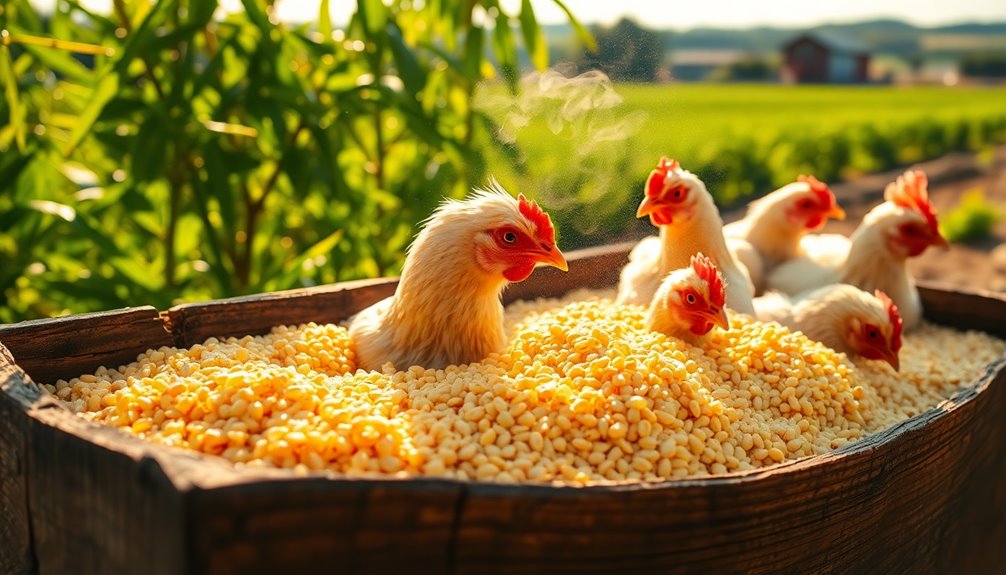
When you feed your chickens fermented grains, you'll notice a boost in their digestive health and overall vigor.
This improved digestion allows them to absorb nutrients more effectively, leading to better egg production.
Plus, healthier hens mean larger egg yolks and a more productive flock, especially during those colder months.
Improved Digestive Health
Fermented grains can greatly enhance your chickens' digestive health, providing a range of benefits that contribute to their overall well-being.
By incorporating fermented feed into their diet, you'll notice improved health and feed efficiency. Here are three key advantages:
- Enhanced Digestibility: Fermented feed increases the digestibility of nutrients, particularly protein and phosphorus, allowing your flock to better absorb essential vitamins and minerals.
- Supportive Gut Health: The presence of beneficial bacteria in fermented grains combats pathogens like Salmonella and E. coli, promoting a healthier digestive tract.
- Cleaner Environment: Regular consumption of fermented grains leads to drier droppings, making it easier to maintain a clean space and further reducing disease risks.
These benefits make fermented grains a smart choice for boosting your flock's overall health.
Enhanced Egg Production
Incorporating fermented feed into your chickens' diet can greatly boost egg production and quality. Hens fed fermented feed often produce larger eggs with thicker shells, enhancing overall egg nutrition.
Studies show that these diets can increase egg production rates by 10-15%, ensuring a consistent supply even during winter months when production typically dips. The improved nutrient absorption from fermented feed means healthier hens that can better utilize protein, vital for ideal egg production.
Additionally, customers have noted the superior taste and quality of eggs from hens on fermented diets, leading to increased market value and consumer satisfaction.
Nutritional Enhancements From Fermentation
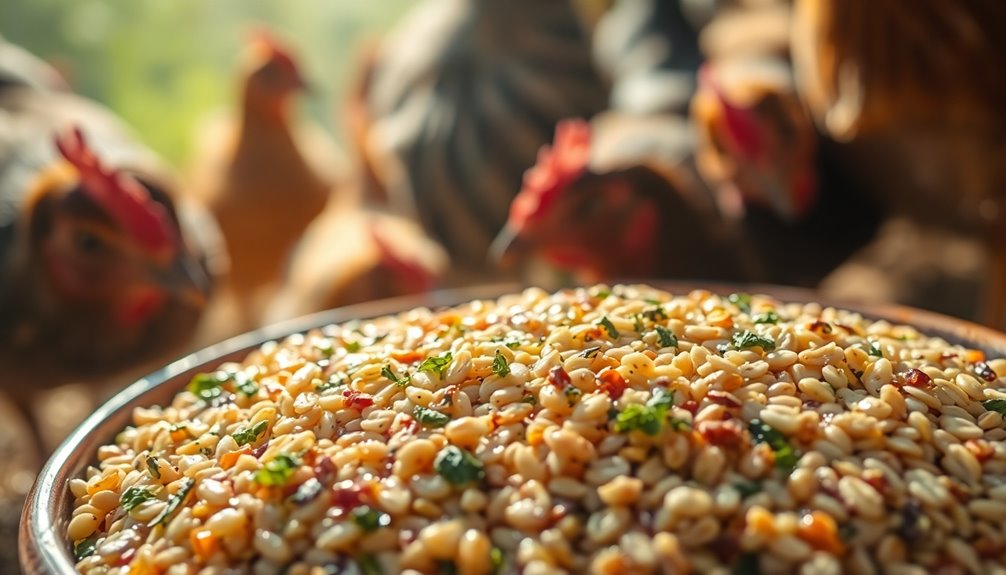
By enhancing nutrient absorption through fermentation, chickens benefit greatly from improved feed efficiency.
Fermented feed breaks down phytic acid, increasing the bioavailability of essential vitamins and minerals. This process not only enriches the nutritional value of the feed but also supports better protein digestibility. Additionally, diversifying feed sources can further enhance the overall health benefits for your flock.
Here are three key benefits of fermented grains:
- Improved Digestion: Fermentation promotes beneficial lactic acid bacteria, improving gut health and combating harmful pathogens.
- Increased Nutritional Value: New vitamins, especially B vitamins like folic acid and riboflavin, are generated during fermentation.
- Lower Feed Costs: With improved digestion, chickens require less feed, leading to potential savings.
Incorporating fermented grains into your flock's diet can greatly enhance their overall health and productivity.
Fermentation Process and Practical Tips
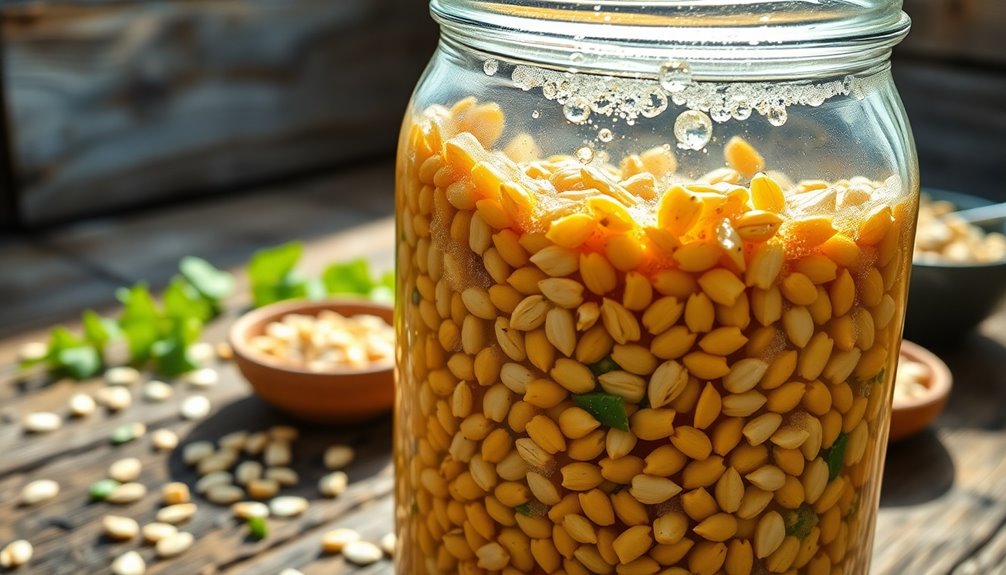
Understanding the fermentation process is essential to maximizing the benefits of fermented grains for your chickens.
Start by soaking whole grain chicken feed in dechlorinated water to initiate fermenting feed. Fill a container halfway with feed, cover it with water, and let it sit in a warm spot. Stir daily to encourage bubbling and a pleasant sour smell.
Monitoring fermentation is vital; look for signs of successful fermentation like bubbles and a tangy aroma. If you notice foul smells or mold, start over.
Regularly add water as needed to keep the moisture level ideal, preventing mold growth. This process not only creates a healthy treat but also helps improve nutrient absorption and feed efficiency for your flock.
Seasonal Feeding Practices for Flocks
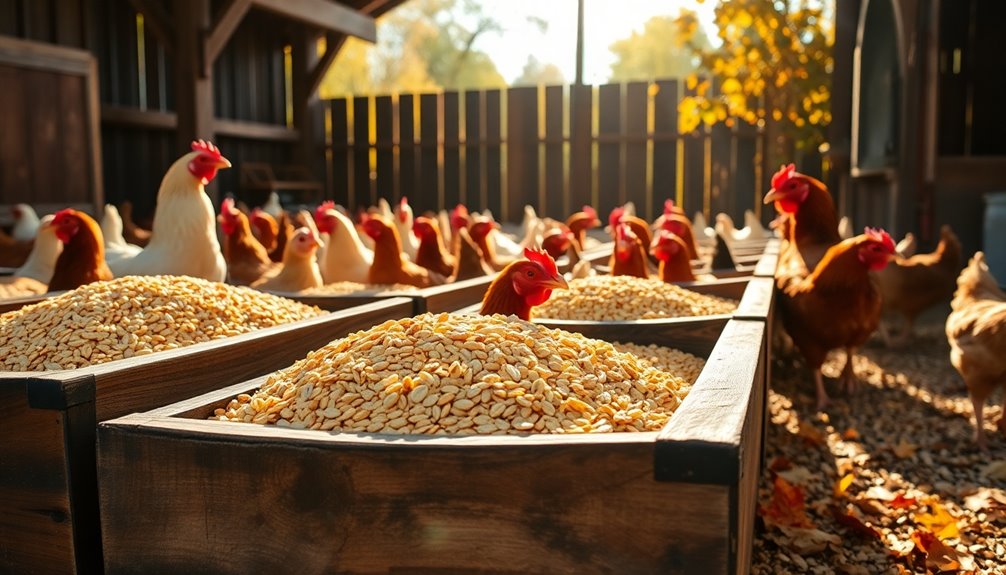
As the seasons change, adjusting your feeding practices can greatly enhance the health and productivity of your flock. Here are some tips for seasonal feeding:
1. Winter: Feed small portions of fermented feed in the morning and late afternoon to prevent freezing, ensuring hens get adequate nutrition before roosting.
Monitor feed temperature and moisture to maintain effectiveness.
2. Summer: Offer fermented grains in the evening to align with hens' natural foraging behaviors.
This promotes healthier diets and hydration.
3. General: Regularly adjust feeding schedules based on seasonal changes.
Ensuring moisture in fermented feed during winter provides hydration, while preventing spoilage is essential year-round for ideal flock health and productivity.
Experimenting With Fermented Feed
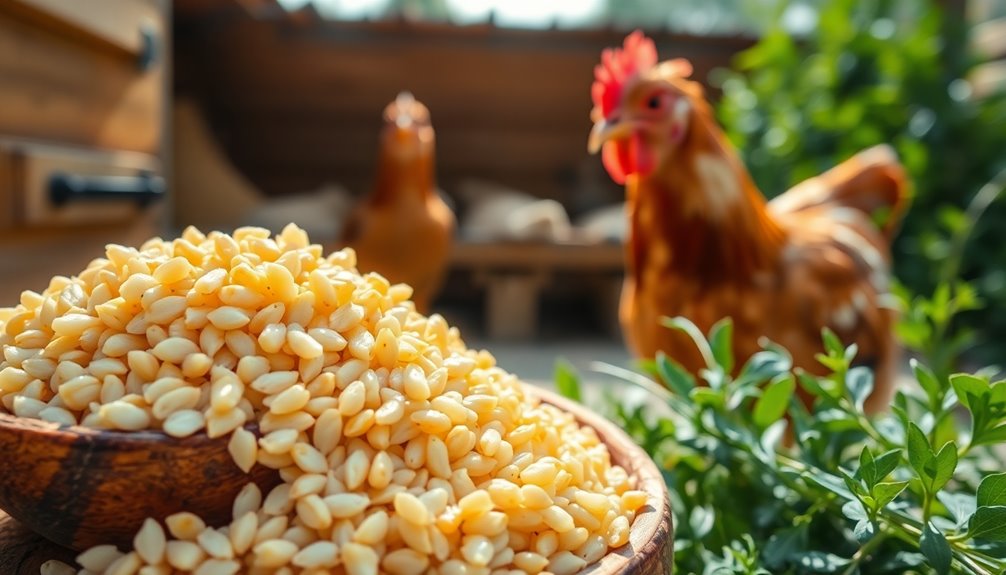
Experimenting with fermented feed can greatly benefit your flock's health and egg production. Start by fermenting whole grain feed, which typically takes three to four days.
Stir the mixture daily while monitoring for bubbling and a pleasant sour smell, signs of active fermentation. Pay attention to water levels to prevent mold, adjusting your method based on seasonal changes—smaller portions in winter to avoid freezing and larger batches in warmer months.
Use glass jars to prevent chemical leaching and enhance fermentation outcomes. After introducing fermented feed, conduct regular health assessments of your flock.
This will help you adjust feeding practices as needed, ensuring ideal nutrition and improving overall productivity. Your chickens will thrive with this new feeding strategy!
Frequently Asked Questions
Are Fermented Grains Good for Chickens?
Yes, fermented grains are great for chickens! They enhance digestion and nutrient absorption, so your flock gets more vitamins and minerals.
The fermentation process introduces beneficial probiotics, improving gut health and reducing harmful bacteria. You'll likely notice better egg production and quality, too.
Plus, your chickens might eat less feed since they digest nutrients more efficiently, which can save you money.
Fermented grains also help with cleaner droppings, making maintenance easier.
Can You Feed Fermented Feed to Chickens Every Day?
Yes, you can feed fermented feed to chickens every day. Doing so enhances their digestion and nutrient absorption, which boosts their overall health.
You'll likely notice improved egg quality, with thicker shells and larger yolks. Plus, fermented feed can help reduce your flock's feed intake due to its higher digestibility, ultimately saving you money.
Just monitor your chickens' response and adjust the amount as needed to meet their nutritional needs.
What Are the Disadvantages of Fermenting Chicken Feed?
When it comes to fermenting chicken feed, you've gotta watch your step. Over-fermentation can leave your birds with a sour taste, making them less likely to eat.
If you don't manage it well, the feed might spoil, leading to foul odors or mold that can harm your flock.
Plus, introducing fermented feed too quickly can upset their digestion, so you need a careful changeover plan to keep everyone healthy and happy.
What Is the Best Fermented Food for Chickens?
The best fermented food for chickens is whole grains.
When you ferment these grains, it enhances their nutrient absorption and digestibility. This process also introduces beneficial probiotics that support gut health.
You'll notice that your chickens will enjoy better overall nutrition without needing to increase feed amounts.
Plus, the fermentation process typically takes just 3-4 days, resulting in a safe and palatable addition to their diet that can lead to improved egg quality.
Conclusion
Incorporating fermented grains into your chickens' diet can transform their health and productivity in ways you never imagined. Picture your flock, vibrant and thriving, pecking at their feed with renewed vigor. As you experiment with fermentation, you'll reveal a world of nutritional possibilities, witnessing firsthand the remarkable benefits unfold. Will you take the plunge and revolutionize your feeding practices? The journey to a healthier, more productive flock awaits—unlock the secrets that fermentation holds and watch your chickens flourish!



